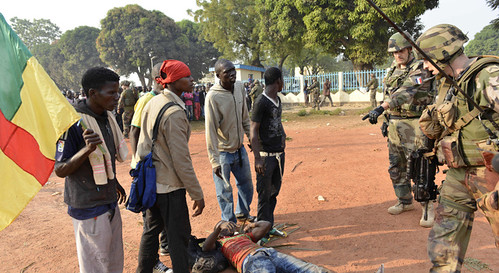
Chadian troops opened fire on demonstrators in the Central African Republic capital city of Bangui killing on person and wounding others. The Chad troops are working with France in occupying the country., a photo by Pan-African News Wire File Photos on Flickr.
Last updated: January 2, 2014 4:35 pm
Fighting intensifies in Central African Republic
By Javier Blas, Africa Editor, and Hugh Carnegy in Paris
Intensifying fighting in the Central African Republic is posing a serious challenge to thousands of French and African troops struggling to restore stability in the lawless country.
Paris deployed 1,600 troops to its former colony in early December with UN Security Council approval to help a 4,500-strong African force. But they appear unable to stop the fighting, with aid organisations pointing to increasing levels of violence.
The situation is causing deep concern in Paris. Two French soldiers have been killed to date and nine soldiers from the Republic of Congo and Chad were killed over the past month.
“It is a very bad situation and it is not clear how it is going to end,” says François Heisbourg, special adviser at the Foundation for Strategic Studies in Paris.
The number of civilians fleeing their homes has increased sharply, aid groups and the UN have said. The UN said that roughly 800,000 people had been forcibly displaced so far, equal to almost 20 per cent of the country’s population. Tens of thousands are seeking shelter in Bangui, the capital, with more than 100,000 people camped out at the city’s airport, crowding there to seek the protection of French forces securing the airfield.
The situation in Bangui, where most foreign troops are based, appears “to be out of control”, Médecins Sans Frontières, the medical charity, said this week. In spite of the presence of international armed forces in the capital, violent attacks and lynchings were still a daily occurrence, it added.
Souleymane Diabate, the head of Unicef, the UN children’s agency, in the Central African Republic said the organisation was “witnessing unprecedented levels of violence”, particularly against children.
“Attacks against children have sunk to a vicious new low, with at least two children beheaded,” he said.
The Central African Republic, a landlocked country in the centre of the continent, has been beset by nine months of near anarchy since the Seleka group, a mainly Muslim alliance of five rebel movements, seized Bangui in March and ousted François Bozizé, a Christian, as president. The rebels propelled into power President Michel Djotodia, the first Muslim president of the majority Christian country.
However, Mr Djotodia has lost control of the Seleka and their widespread acts of banditry have provoked reprisals from Christians militias, known as anti-balaka – literally, “anti-machete” – and launched a cycle of tit-for-tat attacks with Muslim fighters.
By December, concern that a power vacuum in the country could attract organised Islamist groups to set up and destabilise neighbouring states prompted François Hollande, the French president, to launch his second military intervention in Africa within a year.
The operation is on a smaller scale than the January 2013 intervention in Mali to oust Islamist groups threatening to take over the country, also a former French colony.
Mr Hollande last month said France’s short-term aim was to end the violence to allow humanitarian agencies to get food and medical aid to the population. But he added that the longer-term aim was to replace Mr Djotodia and his regime through elections intended to be held by February 2015.
French officials say this remains the intention. But they acknowledge that the situation on the ground is fraught. “A climate of fear reigns in Bangui,” said one.
Mr Heisbourg says Paris underestimated the scale of the task, only the latest of multiple French interventions since the chronically unstable country gained independence in 1960.
“In the past 1,600 French soldiers was sufficient to deal with anything in the Central African Republic. That calculation was badly wrong this time,” he said.
He said a foreign force, ideally under a European flag, of some 5,000-6,000 was needed to restore order.
EU foreign ministers are due to meet on January 20 to discuss stepping up backing for the French action. French officials are seeking more logistical and financial support. Laurent Fabius, foreign minister, has talked of other European countries contributing some troops on the ground. But there seems little prospect of any significant such contribution.
No comments:
Post a Comment